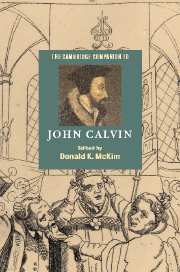Book contents
- Frontmatter
- Part I Calvin’s Life and Context
- Part II Calvin’s Work
- 3 Calvin’s writings
- 4 Calvin as a biblical interpreter
- 5 Calvin’s theology
- 6 Calvin’s ethics
- 7 Calvin’s preaching
- 8 Calvin on piety
- 9 Calvin and social-ethical issues
- 10 Calvin and political issues
- 11 Calvin’s controversies
- Part III After Calvin
- Part IV Calvin Today
- Select bibliography
- Index
3 - Calvin’s writings
from Part II - Calvin’s Work
Published online by Cambridge University Press: 28 May 2006
- Frontmatter
- Part I Calvin’s Life and Context
- Part II Calvin’s Work
- 3 Calvin’s writings
- 4 Calvin as a biblical interpreter
- 5 Calvin’s theology
- 6 Calvin’s ethics
- 7 Calvin’s preaching
- 8 Calvin on piety
- 9 Calvin and social-ethical issues
- 10 Calvin and political issues
- 11 Calvin’s controversies
- Part III After Calvin
- Part IV Calvin Today
- Select bibliography
- Index
Summary
It is not easy to do justice to Calvin's writings in a short article. Most of his writings deal with the Bible and the church, which is not surprising. As a reformer, Calvin devoted himself to the church's reformation. In this he let himself be guided by the Bible. The Bible and then the church - that was the right order for Calvin, and that is the order that we will be following in this chapter.
Calvin thought that people needed to have at their disposal a good translation of the Bible and he did everything to make that possible. He also spent much of his energy in explaining the Bible. Most of his writings are a direct fruit of this effort. Other writings can be connected to his devotion to church reformation of which his fight against heresy, sects, and other abuses is also a part. Some of his writings about doctrinal subjects like free will, election, and the Trinity are also significant. However, my decision to focus on the Bible and church means that those subjects will only be mentioned at the end of the article.
CALVIN AS A HUMANISTIC JURIST
Calvin’s earliest writing has nothing to do with theology. On the advice of his father who in 1527 became involved in a conflict with the cathedral chapter of Noyon, Calvin studied law in Paris at the Collège de Montaigu.
- Type
- Chapter
- Information
- The Cambridge Companion to John Calvin , pp. 41 - 57Publisher: Cambridge University PressPrint publication year: 2004
- 2
- Cited by

